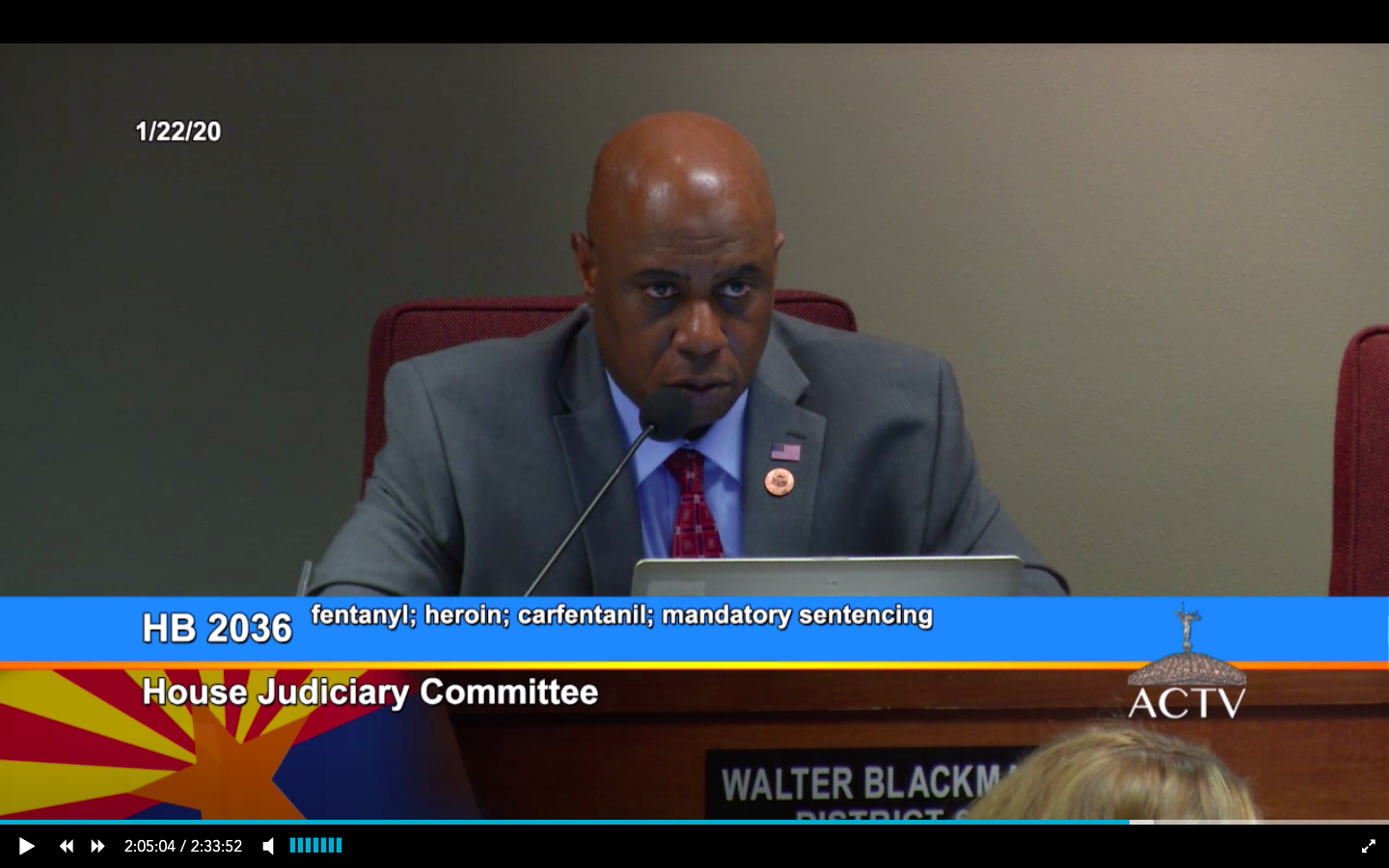
Arizona Legislature

Audio By Carbonatix
On Wednesday, Arizona lawmakers moved ahead with a bill that would require a mandatory minimum five-year sentence for people caught with even small amounts of heroin or fentanyl. One surprise yes vote among them: Representative Walt Blackman (R-Snowflake), who has otherwise made an image for himself as a champion of criminal justice reform.
“We were surprised and honestly disappointed,” said Becca Fealk, program coordinator for American Friends Service Committee (AFSC-AZ), a criminal justice reform group, of Blackman’s vote. “Representatives Blackman, (Nancy) Barto, and (Bret) Roberts all said, ‘We don’t agree with … how the bill is written, but we’re voting yes,’ and I don’t understand the logic behind that … It’s unfortunate because people who voted yes but are hoping it would change could have voted no.”
HB 2036, filed by Representative Steve Pierce (R-Prescott) in November at the request of Yavapai County Attorney Sheila Polk, boosts the prison sentences for people convicted of selling or distributing heroin, fentanyl, and carfentanil. The mandatory sentence would also apply to people who administer the drug to another person.
Selling narcotics already carries a minimum four-year sentence and a maximum 10-year sentence in Arizona, with some possibility of probation. Under Pierce’s bill, people caught selling any amount of heroin or fentanyl will face a mandatory five-year minimum sentence for first-time offenses, with the possibility of being sentenced up to 15 years. A convicted offender would not be eligible for probation, pardoning, or any other release from confinement. Anyone previously convicted of the same charges would face a minimum 10-year sentence, with a maximum of 20 years.
Pierce said at a hearing in the House Judiciary Committee for the bill on Wednesday that he thinks Arizona incarcerates too many people for drug offenses. Yet he claimed mandatory minimums were warranted in this case because fentanyl is “a killer … it’s not like other drugs at all.”
Yet opponents of the bill pointed out that the legislation would force people with substance abuse issues to go to prison instead of getting help. While the bill purports to targets opioid sellers, it ignores the fact that people struggling with addiction frequently sell small amounts of drugs to other opioid users to sustain their own habit.
“We have a stereotype in our minds that all drug traffickers are kingpins, that they are the evil villains we see on crime TV shows,” Molly Gill, director of Families Against Mandatory Minimums, said at the hearing. Yet, “it is very common for opioid addicts to sell drugs to one another and share drugs together. “
Pima County Public Defender Joel Feinman said that a 2016 study of all Pima County drug cases conducted by his office found that 75 percent of people charged with selling drugs were “small-time users selling drugs to support their habit.” Nearly 60 percent of those people were first-time offenders.
Ultimately, even the lawmakers at the hearing who supported the bill said they took issue with it in its current form and felt that the scope of the bill needed to be narrowed. All six Republicans on the committee voted yes; all four Democrats voted no. Now, the bill will be sent on to the full House for consideration.
“I do not think that this bill addresses the problem of substance abuse,” Blackman told the other representatives. “I would like to see this bill held, however, there is an opportunity to work this bill with an amendment. Therefore I am voting yes for this bill, on the contingent that I am able to work an amendment on this bill using all resources available to narrow the scope of this. If we are not able to do that, on the floor, I will vote no.”
Blackman’s yes vote in the committee was critical.
“This bill could have been stopped from moving with his vote,” Fealk said. “It’s very disappointing and disheartening to see.”
On Wednesday evening, a member of the Arizona Prison and Sentencing Reform Facebook group sent an email to the news media, including reporters at Phoenix New Times, stating that “families who trusted Walter Blackman have been betrayed.”
The email contained screenshots from the Facebook page in which commenters said they were “speechless,” and called Blackman’s vote “sickening” and a “disappointment.”
Others called Blackman a “snake,” that he had finally showed his “true colors,” and that he “is not who he claims to be.”
“His vote today to move HB 2036 … to the floor proves he is no champion of criminal justice reform,” said the Facebook group member who sent the email and asked to remain anonymous. “Many of our loved ones are serving sentences for drug possession and low-level sales. We thought that with Blackman we finally had hope they would come home soon.”
Blackman’s office did not respond when contacted by New Times.